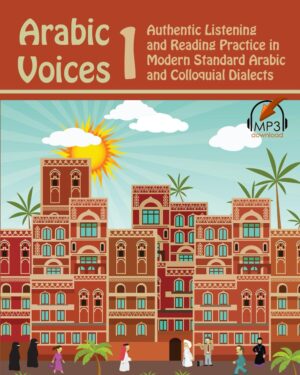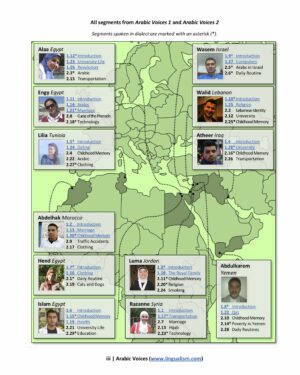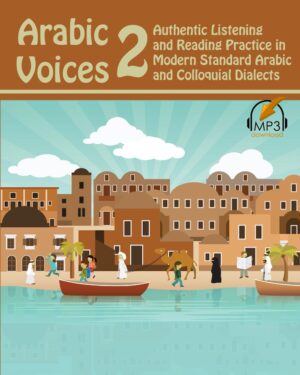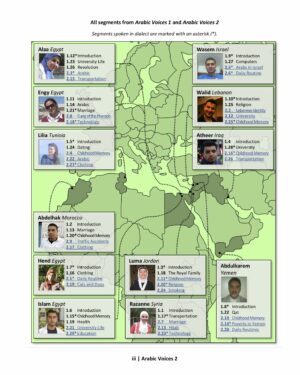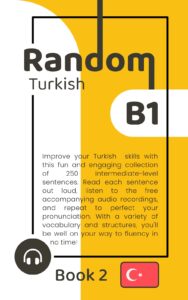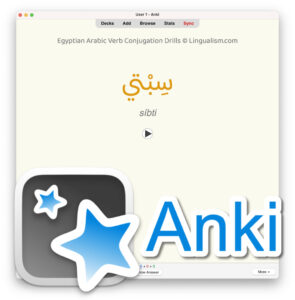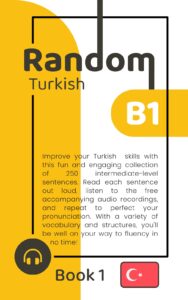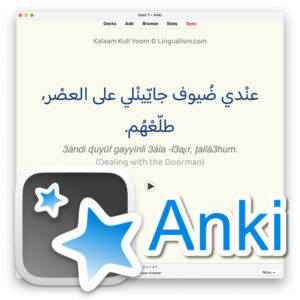☀️SUMMER SALE! 😎SAVE 10% for a limited time. Use coupon code LING10 at checkout. Sale ends July 31. (Offer excludes sale items, bundles, and store credit.)
Home » Modern Standard Arabic » The Arabic Language–Engy
The Arabic Language–Engy
| Greetings! [00:00] | السلام عليكم ورحمة الله وبركاته. | |
| Welcome to a new Arabic Voices video. [00:03] | أهلاً ومرحبًا بكم في فيديو جديد من فيديوهات Arabic Voices. | |
| Today we will talk about what Engy said about the Arabic language, the different Arabic dialects, and the different countries that use the Arabic language. [00:07] | اليوم سنتحدّث عمّا قالته إنجي بشأن اللغة العربية، واللّهجات العربية المختلفة، والبلدان المختلفة التي تستخدم اللغة العربية. | |
| Let's start on page 73. Engy says on line 2, "and it is the official language of more than 25 countries in the world." [00:20] | فهيا بنا نبدأ في الصفحة الثالثة والسبعون—تقول إنجي في السطر الثاني: (وتعتبر اللغة الرسمية لأكثر من 25 دولة في العالم). | |
| Engy says that Arabic is the official language—and an official language is the language used by most language speakers in a country. [00:35] | فتقول إنجي هنا أن اللغة العربية هي اللغة الرسمية—واللغة الرسمية هي اللغة التي تستخدم من قبل معظم متحدّثي اللغة في دولة ما. | |
| In Egypt, for example, the official language is Arabic, meaning most of the population speaks Arabic as the mother tongue or the original language, and it is also used in government affairs. [00:49] | ففي مصر مثلًا اللغة الرسمية هي اللغة العربية، أي أن معظم السكان يتحدّثون اللغة العربية اللغة الأم أو اللغةالأصلية لهم، وهي تستخدم في المصالح الحكومية كذلك. | |
| The official language is the first language. In Egypt, for example, it is Arabic. In America, it is English. In France, it is French. [01:04] | فاللغة الرسمية هي اللغة الأولى. في مصر مثلًا هي اللغة العربية، في أمريكا هي اللغة الإنجليزية، في فرنسا هي اللغة الفرنسية. | |
| There is the official language, the first language, and there is the second language. [01:13] | فهناك اللغة الرسمية اللغة الأولى، وهناك اللغة الثانية. | |
| In Egypt, for example, the second language is English. In America, the second language is Spanish, and so on. [01:18] | ففي مصر مثلًا اللغة الثانية هي الإنجليزية، في أمريكا اللغة الثانية هي الأسبانية، وهكذا. | |
| There is always an official language and a second language. [01:26] | هناك دائمًا اللغة الرسمية واللغة الثانية. | |
| Great! Then we turn to line 7. Engy says, "in addition to some neighboring countries that recognize Arabic." Engy uses the word بالإضافة (in addition) to mention something related to what she said before. [01:32] | عظيم! ننتقل بعد ذلك إلى السطر السابع—تقول إنجي: (بالإضافة إلى بعض الدول المجاورة التي تعترف بالعربية)، تستخدم إنجي هنا كلمة [بالإضافة] لذكر شيء له علاقة بما قالته من قبل. | |
| You can use the conjunction بالإضافة إلى (in addition to) if you want to say something related to or related to what you have already said. [01:54] | فيمكنك أن تستخدم أداة الربط [بالإضافة إلى] إذا أردت أن تقول شيء له علاقة أو يتعلّق بما قلته من قبل. | |
| For example, she says, "All the inhabitants of the Arab world speak Arabic, as well as some neighboring countries speak... Arabic or recognize Arabic as its official language)." [02:04] | فمثلًا هي هنا تقول أن: (يتحدّث كل سكان دول العالم العربي اللغة العربية، وكذلك بعض الدول المجاورة تتحدّث... اللغة العربية أو تعترف باللغة العربية كلغة رسمية لها). | |
| In addition to,' that is, you mention something related to what you said before... [02:23] | [فبالإضافة إلى] أي أنك تذكر شيء له علاقة بما قلته من قبل... | |
| And it means وكذلك (as well). You can use 'as well as some neighboring countries.' [02:29] | وهي تعني [وكذلك]. يمكنك أن تستخدم (وكذلك بعض الدول المجاورة). | |
| For example, you can say, "I like writing... or love to write in addition to reading." [02:36] | مثلًا يمكنك أن تقول: (أنا أحب الكتابة… أو أحب الكتابة بالإضافة إلى القراءة) | |
| That is, you love to write and love to read. "I love writing, in addition to reading. I love writing poetry, in addition to writing short stories." and so on. [02:45] | أي أنك تحب الكتابة وتحب القراءة؛ (أنا أحب الكتابة، بالإضافة إلى القراءة—أنا أحب كتابة الشعر، بالإضافة إلى كتابة القصص القصيرة) وهكذا [بالإضافة إلى]. | |
| Great! We then move on to line 8. Engy says, "Also, knowing some words of the Arabic language is very important during prayer for Muslims from all countries of the world." [03:03] | عظيم! ننتقل بعد ذلك إلى السطر الثامن—تقول إنجي: (كما أن معرفة بعض كلمات اللغة العربية مهم جدًا أثناء الصلاة بالنسبة للمسلمين من جميع دول العالم). | |
| Engy uses a word أثناء (during, while) which means خلال. You can use either one. [03:22] | تستخدم إنجي هنا كلمة [أثناء] وهي بمعنى [خلال] فيمكنك أن تستخدم [أثناء أو خلال] بمعنا واحد. | |
| She says, "Knowing some words of the Arabic language is very important during prayer for Muslims." [03:33] | فتقول: (معرفة بعض كلمات اللغة العربية مهم جدًا أثناء الصلاة بالنسبة للمسلمين، أو خلال الصلاة بالنسبة للمسلمين). | |
| أثناء or خلال, that is, 'during' any period of time, or at the same time as you perform something. [03:45] | و[أثناء وخلال] أي خلال فترة ما، أوفي نفس الوقت الذي تقوم به بأداء أمر ما. | |
| For example, you can say, "I write notes while watching the video." [03:55] | فيمكنك مثلًا أن تقول: (أنا أكتب الملحوظاتخلال مشاهدة الفيديو)، أو (أنا أكتب الملحوظات أثناء مشاهدة الفيديو). | |
| Both of them have the same meaning: to talk about the time period in which you are doing something, أثناء or خلال [04:07] | [أثناء أو خلال] كلاهما بمعنا واحد، للتحدّث عن الفترة الزمنية التي تقوم فيها بأداء شيءٍ ما، [خلال أو أثناء]. | |
| Great! Then we turn to line 10. Engy says, "but given the geographical diversity of that country, we find that the dialects are different." [04:22] | عظيم! ننتقل بعد ذلك إلى السطر العاشر—تقول إنجي: (ولكن نظرًا للتنوع الجغرافي لتلك البلاد، فنجد أن اللهجات مختلفة). | |
| Engy uses the word نظرًا ل (because of) here. نظرًا إلى or نظرًا ل. You can say, "but due to geographic diversity" with the same meaning, namely 'because of.' [04:36] | تستخدم إنجي هنا كلمة [نظرًا ل]... [نظرًا إلى] أو [نظرًا ل]، يمكنك أن تقول: (ولكن نظرًا إلى التنوع الجغرافي) أو (نظرًا للتنوع الجغرافي) بمعنا واحد، وهذا يعني بسبب… هذا يعني بسبب؛ | |
| You could say, "But because of the geographical diversity of these countries, we will find that the dialects are different." [04:57] | يمكنك أن تقول: (ولكن بسبب التنوع الجغرافي لتلك البلاد، سنجد أن اللهجات مختلفة). | |
| These expressions means 'because of.' You mention the reason and then you mention the result. [05:03] | [نظرًا إلى] أو [نظرًا ل] بمعنى بسبب، فتذكر السبب ثم بعد ذلك تذكر النتيجة. | |
| You can say, for example, "because of his health conditions, he does not work." "Due to his health conditions, he does not work." [05:13] | يمكنك أن تقول مثلًا: (نظرًا لظروفه الصحية فهو لا يعمل... نظرًا لظروفه الصحية فهو لا يعمل). | |
| It means 'because of.' Because of his health conditions, hedoes not work. This is a new expression you can use to state a reason. [05:23] | [نظرًا ل] بمعنى بسبب؛ بسبب ظروفه الصحية فهو لا يعمل. فهذا مصطلح جديد يمكنك أن تستخدمه لذكر السبب. | |
| Great! Then we move to line 21. Engy says here, "In addition to the existence of a large number of universities in Egypt, the most important of which is Al-Azhar University..." Engy uses here the word وأهمها (and most important of which [is]). [05:37] | عظيم! بعد ذلك ننتقل إلى السطر الواحد والعشرون—تقول إنجي هنا: (بالإضافة لوجود عدد كبير من الجامعات في مصر، وأهمها جامعة الأزهر) فتستخدم إنجي هنا كلمة [وأهمها]. | |
| It means that Al-Azhar University is the most famous university, or the most important university in Egypt. 'The most important of which.' You can also use the word أبرزها (the most prominent of which). "The most important of which is Al-Azhar University. The most prominent of which is Al-Azhar University." [05:59] | بمعنى أن جامعة الأزهر هي أكثر الجامعات شهرة، أو أكثر الجامعات أهمية في مصر، [فأهمها] يمكنك أن تستخدم كذلك كلمة [أبرزها]، وأهمها جامعة الأزهر وأبرزها جامعة الأزهر. | |
| The most important' or 'the most prominent' have the same meaning–which is that this thing has a greater place than others. [06:22] | [أهم أو أبرز] بمعنا واحد، وهو أن هذا الشيء له مكانة أكبر من غيره. | |
| You can say, for example, "There are many places you can visit in Egypt, the most important of which is the Pyramids... or the most prominent of which is the Pyramids." [06:31] | يمكنك أن تقول مثلًا: (هناك أماكن كثيرة يمكنك زيارتها في مصر وأهمها الأهرامات وأبرزها الأهرامات). | |
| Both have the same meaning. That is, this is of great importance compared to others. [06:42] | [وأهمها—وأبرزها] كلاهما بمعنا واحد، أي أن هذا الشيء له أهمية كبيرة مقارنة بغيره. | |
| Great! We then move to line 22. Engy says, "Egypt is the pioneer in movie production in the Arab world." Egypt is the film industry leader. [06:54] | عظيم! ننتقل بعد ذلك إلى السطر الثانيوالعشرون—تقول إنجي: (فهو أن مصر رائدة صناعة السينما في العالم العربي)، مصر رائدة صناعة السينما. | |
| رائدة (pioneer) here in the sense of قائدة (leader). If a country is a pioneer of industry, or pioneer of an initiative, it is a pioneer in it; that is, a leader is famous in it. [07:12] | [رائدة] هنا بمعنى [قائدة] فإذا كانت هناك دولة ما هي رائدة صناعة، أو رائدة مبادرة ما فهي رائدة في ذلك؛ أي قائدة هي مشهورة بذلك. | |
| Egypt is more famous for the film industry than any other Arab country. [07:27] | فمصر مشهورة بصناعة السينما أكثر من أي دولة عربية أخرى، فهي رائدة صناعة السينما. | |
| You can say for example, "Japan is the leader of the technology industry." 'Pioneer' here in the sense of the leader of the technology industry; that is, it is more famous than any other country in this field. [07:36] | يمكنك أن تقول مثلًا: (اليابان هي رائدة صناعة التكنولوجيا)، [رائدة] هنا بمعنى قائدة صناعة التكنولوجيا؛ أي هي مشهورة أكثر من أي دولة أخرى بهذا العمل. | |
| Japan is leading in the technology industry. Egypt is a pioneer in the film industry in the Arab world and is more famous for this than any other country. [07:50] | اليابان هي رائدة صناعة التكنولوجيا، مصر هي رائدة صناعة السينما في الوطن العربي هي مشهورة بذلكأكثر من أي دولة أخرى. | |
| Then we turn to the last point, namely on line 23. Engy says, "and also, the Egyptian radio that was broadcast in... the 1930s." [08:03] | ننتقل بعد ذلك إلى النقطة الأخيرة، وهي تحديدًا في السطر الثالث والعشرون—فتقول إنجي: (وكذلك الإذاعة المصرية التي تم بثها في... ثلاثينيات القرن العشرين أيضًا). | |
| Engy here uses the word (also) to add an order ... To add something, you can also use the word أيضًا (also, too) at the end of the sentence to say that what you said is an addition to something else you mentioned earlier. [08:24] | تستخدم إنجي هنا كلمة [أيضًا] لإضافة أمر ما... لإضافة أمر ما، فيمكنك أن تستخدم كلمة [أيضًا] في نهاية الجملة لذكر أن ما قلته هو إضافةً إلى شيء آخر ذكرته من قبل. | |
| For example, you can say, "I like listening to music and watching movies, too." That is, watching movies is in addition to listening to music. [08:42] | فيمكنك مثلًا أن تقول: (أنا أحب سماع الموسيقى، ومشاهدة الأفلام أيضًا)؛ أي أن مشاهدة الأفلام هي إضافةً إلى سماع الموسيقى. | |
| You can use كذلك (as well) instead of أيضًا (also, too) at the end of the sentence. You can say, "I love listening to music and watching movies, as well." [08:54] | يمكنك أن تستخدم [كذلك] بدلًا من [أيضًا] في نهاية الجملة فيمكنك أن تقول: (أنا أحب سماع الموسيقى، ومشاهدة الأفلام كذلك). | |
| Both have the same meaning, used for addition. [09:05] | [كذلك أو أيضًا] كلاهما بمعنا واحد ويستخدمان للإضافة. | |
| "I like reading, and I like writing, too. I love reading, and I love writing, as well." They're used... they're used with the same meaning. [09:12] | (أحب القراءة، وأحب الكتابة أيضًا—أحب القراءة، وأحب الكتابة كذلك) [كذلك أو أيضًا] يستخدمان... يستخدمان بمعنا واحد. | |
| So, we have finished commenting on what Engy said about Arabic. [09:28] | وبهذا نكون قد انتهينا من التعليق عمّا قالته إنجي بشأن اللغة العربية. | |
| I hope you have benefited from this video, and I will see you in another video. [09:34] | أتمنى أن تكونوا قد استفدتم من هذا الفيديو، و ألقاكم في فيديو آخر. | |
| Thank you very much. May peace and God's mercy and blessings be upon you. [09:39] | أشكركم شكرًا جزيلًا، والسلام عليكم ورحمة الله وبركاته. |
Video Lessons
Arabic Voices MSA Lessons
Arabic teacher Mostafa Ahmed takes us through segments in MSA from Lingualism's book Arabic Voices 1: Authentic Listening and Reading Practice in Modern Standard Arabic and Colloquial Dialects, explaining interesting points of grammar and vocabulary.
© 2024 Lingualism LLC

